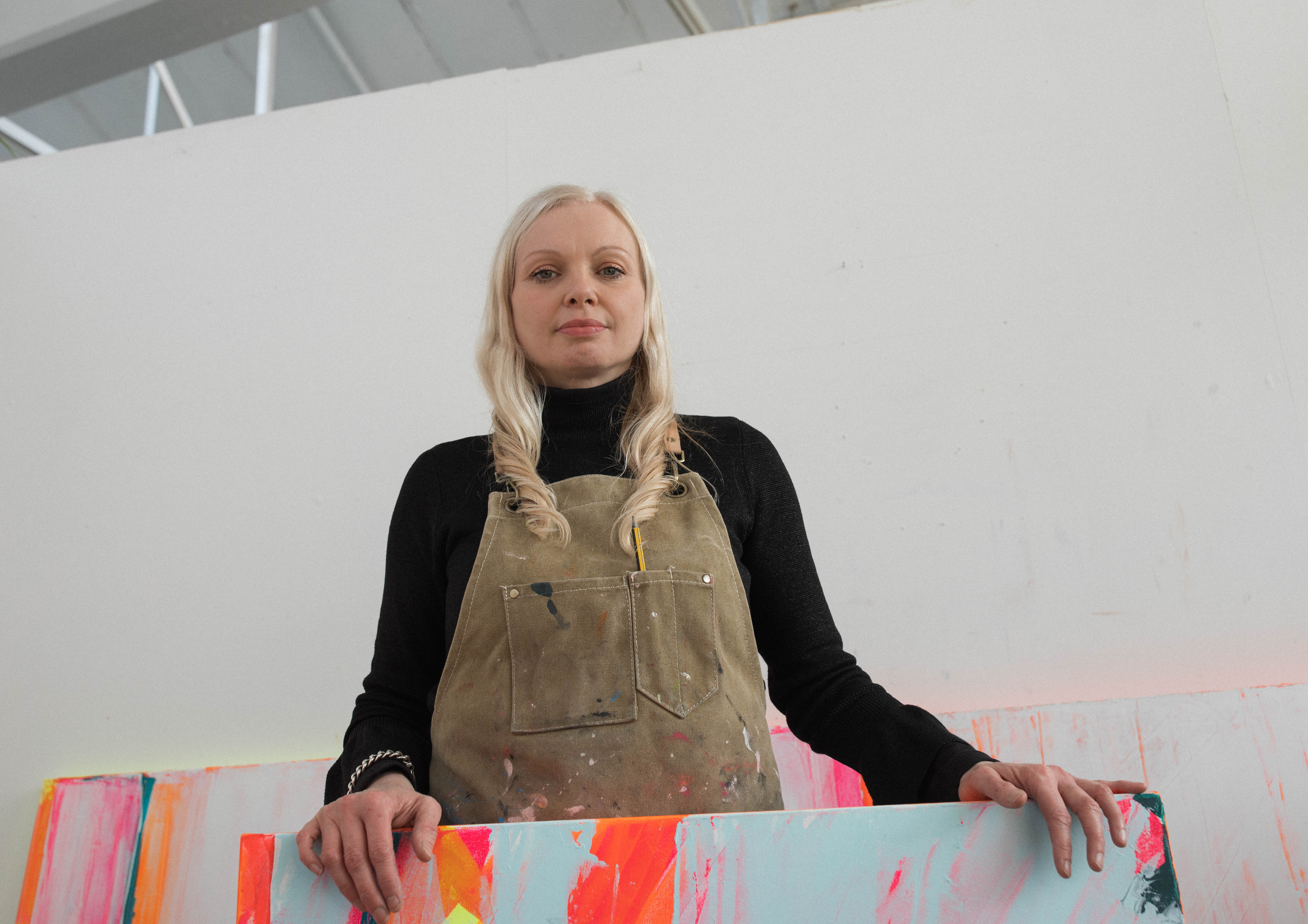

Kelda Storm is a London based artist who works around the contemporary feminist concept of the female gaze. With striking immediacy, she investigates the duality and complexity of the meaning of images and language within the context of femininity, representation and autonomy. She holds a Masters Degree from UAL: Camberwell College of Arts. Her work has been exhibited in London, most recently at Saatchi Gallery.

UNAVAILABLE
100 x 70 cm
Unique Silkscreen on Fine Art Paper
SOLD
100 x 70 cm
Unique Silkscreen on Fine Art Paper
This work includes a certificate of authenticity
Kelda has perfected the silkscreen technique to create her unique monoprints. This technique, made famous by Andy Warhol, is a physical, delicate fine art technique of layering paint layers. In this method, artists wipe paint through a screen onto a piece of fine art paper. Because the negative space is blocked by stencils, paint can selectively pass through a screen to form the imagery. Using an analogue printing technique alongside abstraction adds to the post-digital feel of Kelda's practice. Kelda chooses screenprint because of its aesthetic quality and subtle texture, further enhanced when colours overlap. Made by hand, each of her silkscreen is unique. Using a medium known for reproduction and the creation of multiples, Kelda creates one-off pieces rather than mass-produced editions.

In a gallery setting the artist's work takes on a new form. It becomes one larger piece made of multiples, often displayed in a grid form. Reminiscent of fly-posters, billboard advertising or an Instagram feed. The display encourages the visual elements in her artwork to bounce off one another to form connections between the individual pieces displayed.

Created as a set of 9 prints especially for where’s the frame? Kelda has continued to further explore the monoprint. With this collection of work, Kelda adds abstracted printmaking marks using screenink and a squeegee. With this process, Kelda explores colour and balance, alongside the use of repeated imagery, text and motifs. In her work, the line ‘Cheer Up Love’ is repeated and repeated again. Generally a comment from a man to a woman, this all too familiar line is increasingly being recognised as harassment and a prime example of widespread objectification, it stands for the gender imbalance ingrained in contemporary society and has been fought for decades. Seemingly innocent, but why would women have to put a fake smile on their face? Why would someone feel like they had a right to comment on what one’s body, and on any emotions, they may have?

It revolves around the male gaze, a theory that came to the forefront in feminist theory from the 70s. During that time, art emerged that addressed feminist issues. In the beginning, the main analysis was the social and economic factors that had prevented talented women from attaining the same status as their male counterparts. They questioned the central place of the female nude in the Western canon and asked why men and women are portrayed so differently. In his 1972 book, Ways of Seeing art critic John Berger concluded, ‘Men look at women. Women watch themselves being looked at’. This is echoed in Kelda’s work. ‘Cheer Up Love’ evokes this sentiment: women function for men to look at.
SOLD
100 x 70 cm
Unique Silkscreen on Fine Art Paper
SOLD
70 x 50 cm
Unique Silkscreen on Fine Art Paper
In 1975, Laura Mulvey, a British feminist film critic, describes the ‘male gaze’, which up to this day is a frequent topic for discussion. It means that in films, visual arts and literature, the world and women are depicted from and revolve around a male point of view. Women often did not represent much beyond being sex objects. They don’t have a backstory or only function to develop the plotlines centred on a male protagonist. The female nude, in particular, depicted by men, eroticizes traditional gender hierarchy and an unequal balance of power. This is seen as part of the complex mechanism that perpetuates gender inequality.

Since then, investigating the ‘male gaze’ has been seen as something important and is common in contemporary pieces. More recently, the ramifications of the 'female gaze’ are increasingly being investigated. When men are taken out of the equation, and female artists, photographers, directors and other creatives portray other women, what does that mean? Kelda works exactly around these notions of the male versus the female gaze. ‘Cheer up love,’ these three words perfectly spell out the crucial problem of the act of objectification while recontextualising it by pairing it with lips. As has explained: ‘They sexualise and sensualise the female form, yet they are also a symbol of speech and voice’.
SOLD
100 x 70 cm
Unique Silkscreen on Fine Art Paper
Follow Kelda on her instagram and her website.
Artwork photographs courtesy of the artist. Portraits taken by Alina zum Hebel (website/ instagram). Photography courtesy of where’s the frame? and Alina zum Hebel.
where’s the frame? - ‘PAPER MODE’ is a collection of 6 up and coming London based artists. The collection is available from April 21, 2021, until July 21, 2021.
Want to know more about the artist
or want to be the first to hear about our next collection?